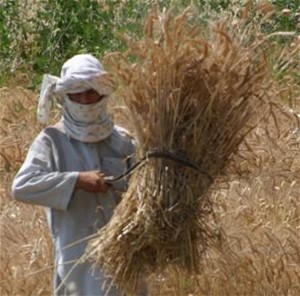
Din Mohammad, a wheat farmer from the village of Sarasyab in Balkh, is grateful for USAID-funded wheat seed and fertilizer that enabled him to save surplus harvest for his family.
USAID/ASAP
Wheat seed and fertilizer enable Balkh Province’s farmers to grow a surplus of wheat in 2009.
24 OCTOBER 2009 | MAZARI SHARIF, AFGHANISTAN
Afghanistan’s northern and western regions have traditionally produced large volumes of wheat. Following 2008’s near-disastrous wheat harvest due to the country’s worst drought in 10 years, experts were predicting an even bleaker outlook for 2009. Last year, many farmers found themselves with limited food supplies for their families and were forced to sell off livestock to make ends meet. USAID responded with an effort to increase production by supplying farmers with high-quality fertilizer and certified wheat seed.
USAID partnered with local organizations to distribute the needed seeds and fertilizer in 14 northern and western provinces. In Balkh Province, Afghan Community Development Councils identified the farmers and issued vouchers. The farmers were then able to purchase the wheat seed and fertilizer at a 30-70 percent discount at local AgDepots (Agriculture Depots), which are Afghan-owned rural farm stores.
Din Mohammad, a resident of Balkh Province’s fertile Sholgara district, was one of the 20,000 farmers who received wheat seeds and fertilizer from USAID. “Last year, we faced a shortage of food, especially wheat. We had to sell our sheep, camels, cattle, and donkeys in order to buy wheat and flour,” he said. “This year we harvested far more wheat and will keep the surplus for our family’s use.”
A report released on June 2, 2009 by the UN Food and Agriculture Organization and the Afghan Ministry of Agriculture, Irrigation and Livestock estimates a 63 percent increase in Afghanistan’s wheat production over last year.
Shams Kateb, Director of Balkh’s Agriculture Directorate, explained that a number of factors came together to make Afghanistan nearly self sufficient in wheat this year. “The high price of wheat in the local market resulting from last year’s decreased supply, timely government assistance in controlling locusts, and farmers’ use of certified seeds and fertilizers all played their part,” he said. Sufficient rainfall also played a role. All in all, more Afghans will have enough bread to eat this winter thanks to these favorable factors and USAID’s assistance.







Comment
Make a general inquiry or suggest an improvement.